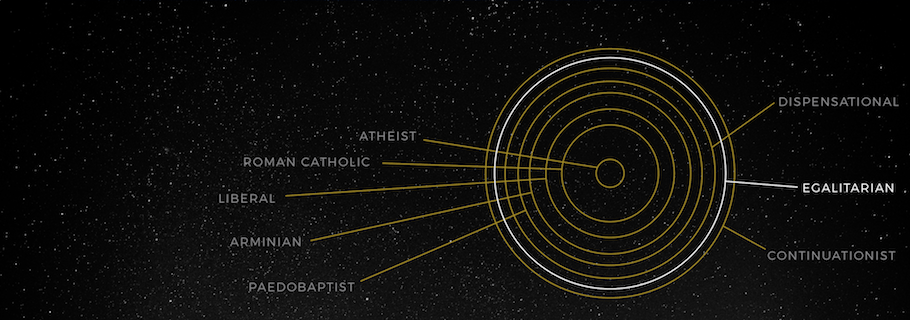I’ve got just two articles remaining in this series I’ve titled “Why I Am Not…” Week by week I am describing why I have rejected some theological positions in favor of others and my purpose is not so much to persuade as it is to explain. There is a story behind every position I hold and each of these articles tells one of those stories. I have already told why I am not atheist, Roman Catholic, liberal, Arminian, paedobaptist, or dispensational. Today I want to tell why I am not egalitarian.
I ought to begin with a couple of key definitions. Egalitarianism is “the theological view that not only are all people equal before God in their personhood, but there are no gender-based limitations of what functions or roles each can fulfill in the home, the church, and the society.” That position is contrasted by complementarianism “which holds the theological view that although men and women are created equal in their being and personhood, they are created to complement each other via different roles in life and in the church.”* Both positions affirm the absolute equality of men and women in their being, personhood, dignity, and worth but differ when it comes to whether there are distinct God-given roles and functions associated with each gender, especially as it pertains to home and church.
I am not egalitarian and never have been, but that is not to say that I have not been challenged by the strengths of the position or the excesses of some definitions of complementarianism. I have carefully examined what I believe about manhood and womanhood. I have read widely and, as much as possible, with an open mind and open Bible. I have worked carefully through the relevant biblical texts. As I have done all of this, I have become more and more persuaded by the complementarian position but also more and more concerned about those who misuse or full-out abuse it. In that way I have not only had to define myself as complementarian but to define what kind of complementarian I am.
Let me back up a little bit. Aileen and I both grew up in traditional middle-class Canadian homes where the dads provided for their families while the moms focused on caring for the home and raising their children. We did not often hear words like “leadership” and “submission” but saw them quietly and seamlessly lived out in a context of mutual love and respect. I grew up attending various churches and these were, likewise, always very traditional in their understanding of the complementary roles of men and women in home and church.
As Aileen and I began to consider our future together we assumed we would follow patterns similar to what we had experienced in our childhood. To my recollection, our first real discussion came when choosing our wedding vows. We wanted to use traditional Anglican vows, largely because of their proud tradition and beautiful wording. But we had to discuss the word “obey.” These vows would have me promise to “love and cherish” Aileen while she would promise to “love, cherish, and obey” me. While we did not love the word “obey,” neither did we have strong objections to it or wish to break with tradition. Those are the vows we made to one another.
It took me years to understand that passive leadership is an oxymoron.
Despite our vows, we did not get off to a great start as a complementarian couple, and I am convinced this was largely my fault. I was passive and immature and easily intimidated even by my sweet wife. An older couple had told us that the husband’s leadership role involves little more than exercising his authority as a tie-breaking measure. Since we rarely disagreed about anything consequential I saw no reason or opportunity to lead. It took me years to understand that passive leadership is an oxymoron. It took me longer still to understand that a husband’s leadership is not first a matter of breaking ties or solving impasses, but a matter of being the first to love, the first to serve, the first to repent, the first to forgive. The call to lead is the call to display Christ-like humility and Christ-like love. While I have too often failed at this, it has at least become my aim.
There were a few books that strengthened my convictions: Recovering Biblical Manhood and Womanhood by John Piper & Wayne Grudem was one I referred to many times while Women’s Ministry in the Local Church by Ligon Duncan and Susan Hunt also proved especially helpful. There were others besides, though their titles now escape me. At the same time I was challenged by the growth of the biblical patriarchy movement and quickly came to see that in too many ways it goes beyond what the Bible teaches and dangerously disempowers women. While this did not shake my conviction in complementarianism, it did alert me to one of the ways even good theology can go bad when it extends beyond the Bible’s good boundaries. There are dangers on both sides of truth.
Why, then, am I not egalitarian?
The primary reason I am not egalitarian is because I believe the position fails to withstand serious biblical scrutiny. Certainly it can prevail on a popular or emotional level, but I see no way for it to overcome on a biblical level. The complexity of words like ezer and phrases like mutual submission are far more easily resolved by complementarians than “I do not permit a woman to teach or to have authority over a man” is for egalitarians. Paul’s appeals to Adam’s priority in the order of creation, the distinct male focus in the qualifications of an elder, the extended teaching on marriage in Ephesians 5, the deep mystery and metaphor within marriage—all of these provide challenges to the egalitarian position that I consider insurmountable.
Theology that may be difficult to describe in the abstract is often beautifully displayed in the lives of other Christians.
Second to that, I am not egalitarian because complementarianism has proven itself to me. In the context of Christian community both Aileen and I have been able to see and imitate godly couples and mentors. Theology that may be difficult to describe in the abstract is often beautifully displayed in the lives of other Christians. And in our own marriage we have seen that complementarianism works, that it brings order, that it brings consistency, that it frees each of us to serve the other in ways that appear for all the world to be so consistent with God’s design. It could be that I’ve learned more about complementarianism from Aileen than from anyone else simply by living these eighteen years alongside her.
I am complementarian but far better, we are complementarian. I rely on Aileen, I seek her wisdom, I heed her counsel. I am joyfully and unashamedly dependent upon her and wouldn’t want it any other way. All the while I seek to lead her by pursuing and imitating the One who leads me.










